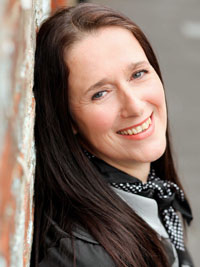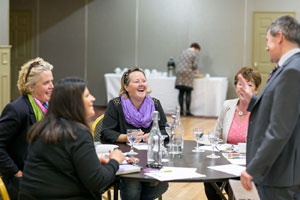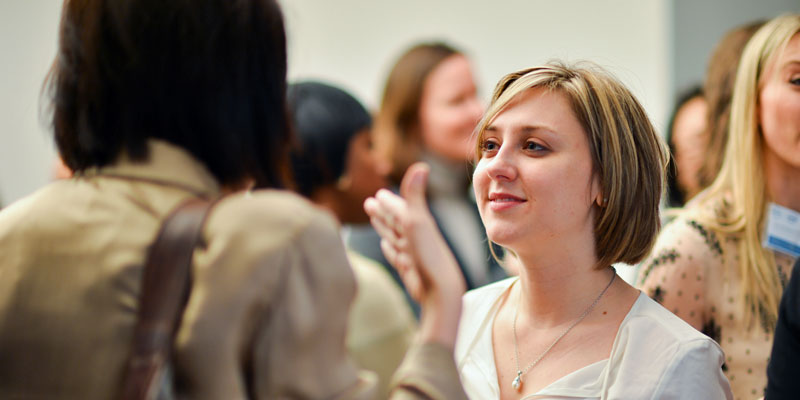Jo Boardman is an innovation and enterprise development specialist. She enables entrepreneurs and enterprising organisations to develop their company, charity, or social enterprise and ultimately achieve a sustainable future for their projects, programmes, services, clients and customers. Jo has over 17 years’ experience of working in both the voluntary and community sectors, as well as social enterprise and social finance.

“…Over a year ago I offered my support to a newly formed charitable foundation set up by a firm of solicitors in Sheffield – their way of giving back to the local community. Whilst providing some of their clients with pro bono support I realised that there was an opportunity to develop something that could have more impact – linking businesses with charities and social enterprises to share ideas, knowledge, expertise, and information in informal settings…”
From aquatics and fisheries to social care, welfare, museums and libraries

When I left university I was unable to secure a job within the marine biology / aquatics industry, so I carried on working in social care for a number of different public sector and charitable sector agencies. After working for the Multiple Sclerosis Society for three years as a welfare liaison advisor at one of their respite centres in York I got the opportunity to work as a regeneration officer for a local community partnership in Doncaster.
I then worked for CISWO (the Coal Industry Social Welfare Organisation) for eight years working my way up the ranks until I was assistant operations manager for Yorkshire Region – supporting local community miners’ welfare schemes, regional convalescent homes, and national projects.
After eight years I realised that there were no other career opportunities for me within what was a male dominated environment, and so I decided to take a totally different career path and secured a partnerships development role within MLA Yorkshire (the regional partnership representing museums, libraries, and archives).
Whilst I was at MLA I was extremely fortunate to work with a fantastic female chief executive called Annie Mauger, who I still view today as one of the most supportive managers I have ever had. She was the first female chief executive I’d worked under and also the first female line manager. Even though I was only there for a short period of time, she was so supportive and appreciative of the work that I did. She was such a great manager because if she felt you weren’t achieving your potential, she would sit down with you and work through how you could be supported to reach your professional goals.
The way that she worked, the way she made you feel and the way she valued your contribution helped shape the way I work today. She gave me such a sense of appreciation for the people I work with – I genuinely believe that people and teams are the strongest assets that organisations have, so for me it’s always about valuing the contribution that they make, and ensuring they realise that they’re appreciated and valued.
Helping charities, voluntary groups and social enterprises become ‘investment ready’
Due to Government funding cuts my role at MLA only lasted 12 short months, but I was then extremely lucky to get offered the position of investment readiness programme manager for Charity Bank in the North. This role was to set up and develop a programme of one to one support, workshops and seminars to assist third sector organisations (charities, voluntary groups and social enterprises) across the Yorkshire Region become more fit for purpose – in effect ‘investment ready’.
We were there to support organisations to develop robust systems, processes, and infrastructure within their organisation, as well as provide them with advice about a range of different funding, social finance, and investment opportunities available to them – other than just being grant reliant. Funded by the then regional development agency, Yorkshire Forward, we were an extremely small team that worked closely with a range of partners to achieve our targets – which we did comfortably within the programme timescale.
Becoming a freelance consultant and loving what I do
It was when we had achieved all of our targets that I realised that working with and supporting charities, voluntary groups, and social enterprises was something that I could do independently of another organisation. Though I didn’t see it as a positive at the time, an incident at work provided me with the impetus I needed to start my own business in 2010 – with the aim to help enterprising organisations become for financially, strategically, and operationally robust.
I have been working as a freelance consultant now for over six years, and can honestly say that I love what I do.
Diverse clients equal a diverse role and diverse days
Every day is different! Because my clients come from such diverse sectors, and can be local, regional, national, or international no two days are the same – which I love!
My days usually start very early so that I can go through all my emails, and prioritise responses, as well as set up my social media scheduling (if I’ve not already done before). The rest of my day can be a mix of current client commitments, prospecting meetings, or admin catch up. I have an office in Sheffield as well as an office at home, and I tend to work between those two locations as well as at clients premises when needed.
The length of my day is dependent on the amount of work I have on, and as I am only one person I do have to be careful how much work I do. I am quite lucky that I have not ever felt the need to go on the myriad of ‘preferred providers’ databases that are around for consultants like me, and also that I do not spend a huge amount of time prospecting for work – I have a fantastic network of contacts and colleagues, and so far have been able to keep myself quite busy work wise!
That’s not to say that I don’t do it at all. When I get time I try and network (as long as I know it is going to be a good use of my time).
The work I do is extremely varied as I get involved with: marketing and communications; social media; strategic and business planning; partnership development; income diversification; governance; organisational development; business engagement and CSR (corporate social responsibility); training and facilitation; and event planning … so I can be pretty busy!
A note of caution: Being a freelance consultant is not easy…

What many people don’t realise is the amount of time and effort you put into every project and / or client you work with to ensure that you are providing them with the best possible support. I take a huge amount of pride in the work that I do, and always bend over backwards to provide every client with the best possible support. More often than not I invest much more time into a project than has been allocated – that is just my work ethic!
Working six or seven day weeks, and 12 hour days when needed
Six years down the line and I still love it, and more often than not I work six or seven days a week, sometimes 12 hours or more a day if needed. I never look at the work I do in pounds, shillings and pence as if I did I know that I would financially be worse off than when I was employed.
I measure by amount of satisfaction I have gained from helping a client be the best they can be, developing fantastic projects and programmes with them, overcoming barriers and challenges so that they can continue to provide their clients, beneficiaries, or communities with support (and technically do myself out of a job)!
My client base is very diverse ranging from museums, art, heritage, advice, animal welfare, sports, military, history, national funders, national and international charities, Government departments, to grassroots charities and social enterprises – across a range of sectors and disciplines.
Enterprising Partners – linking businesses with charities and social enterprises
Over a year ago I offered my support to a newly formed charitable foundation set up by a firm of solicitors in Sheffield – their way of giving back to the local community.
Whilst providing some of their clients with pro bono support I realised that there was an opportunity to develop something that could have more impact – linking businesses with charities and social enterprises to share ideas, knowledge, expertise, and information in informal settings. Business entrepreneurs gain insights from values-driven organisations and third sector leaders gain insights on entrepreneurial and commercial thinking. Thus Enterprising Partners was born!
Having successfully secured some funding via the Big Lottery Fund and additional support from the business community I have developed a format for networking roadshows that has initially been run across Sheffield City Region to try the idea out.
In addition to the funding, financial support from business I have also secured ‘in-kind’ support from a range of different businesses and third sector organisations to cover:
· Project branding;
· Videos for each event;
· Business and third sector leaders providing their time for free giving ‘top tips’ at our industry hot desks that we have at all the events;
· Venue hosts;
· And even a fantastic young lady who has just launched her new high end patisserie business who provides us with free macaroons at all of our events..!
These events offer all attendees, regardless of the sector they have come from, a chance to meet, connect, chat and get advice for free across Sheffield City Region. Our 4th event has just taken place in Doncaster. We have already had over 300 attending these events and we’ve had so much positive feedback from everyone involved.
This type of work is something that is being supported by the Big Lottery Fund, who have produced a report on the The Future of Doing Good, and are now looking at how we can create ‘social value’ within our communities, as well as the Cabinet Office’s Mission-Led Business Review – as it can help bring together all sectors to work more collaboratively.
I am hoping that once I have evaluated the impact of this small pilot that this is something that can be rolled out across the UK – as regardless of location or sector this type of events can positively impact on all involved!
As a result of these roadshows I have been commissioned to run some more for the arts, museum, and heritage sector in Yorkshire in the autumn, so fingers crossed we can replicate this model across the UK too!
What it means to be a mission-led business
I always use the phrase “Doing good is good business” when I am talking to clients, and colleagues. A mission-led business is a business that can see beyond the financial bottom line and is a business driven by “more than profit”, embedding social values and social ethics within its core mission and values.
That doesn’t mean that it doesn’t generate profit, it just means that the business has other social and ethical motivations to consider as well as the financial bottom line – entrepreneurs and investors who want to harness the power of business to make a difference and tackle longstanding social and environmental challenges.
I believe as a nation of consumers we are becoming more ethically aware about the services and products we buy, and we want to know more information about where they are sourced, how they are developed, and what the impact is. This has also been seen with young people looking for the ‘right’ employment opportunities.
More so now than ever before young people are looking to work for employers that have a commitment to values and ethics within their core business model, and the Mission Led Business Review is seeking to highlight how the traditional roles of civil society and business are changing for the better. Showing that the social sector is becoming more business-like and the business sector is more so than ever before keen to demonstrate their social impact.
Structures for social enterprises

Post referendum amid all the uncertainty in the economy – how third sector businesses can adapt and create new opportunities
To be clichéd – “Keep Calm and Carry On”. There are lots of debates, articles and workshops regarding the impact of the referendum on the sector, and I’m sure there will be more to follow. We are entering a transitional phase regarding the EU and our future relationship.
The sector needs to utilise this time effectively to ensure that it has robust strategies, business models, infrastructure, and plans in place to address what may happen in the future. It is an opportunity to take a step back, reflect and review on what needs to be done to become ‘fit for purpose’, and also to ensure that you are ready for future opportunities / challenges, whatever they may be.
I know that there is concern regarding EU funding in designated areas and how that will impact on projects, programmes and organisations, but now is the time for everyone to get their own house in order, manage and maintain those existing European and other international relationships they have, as well as look at how they can begin to develop new fruitful relationships ready for future opportunities.
Coming up for me

I have several current work commitments including currently working with Museum Development Yorkshire, Heritage Lottery Fund and the Arts Impact Fund to run some more business engagement roadshows aimed at the arts, culture and heritage sector. This is initially in Yorkshire, but I would love to expand the geographical reach of these if possible.
I am also still doing my fundraising and income diversification work with local charities and social enterprises. I am also undertaking some research and development work for two National Heritage Networks – one for sport and one for an army museum, and I’m still doing pro bono support as and when I can depending on my work schedule.
Personally, I am really looking forward to taking a week off in July to go down to beautiful St Ives in Cornwall to relax … though the laptop will be coming with me!
https://twitter.com/joboardman
https://www.linkedin.com/in/jo-boardman-7aa0b718
Main image credit: By Dell’s Official Flickr Page [CC BY 2.0 (http://creativecommons.org/licenses/by/2.0)], via Wikimedia Commons





